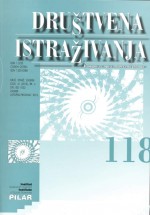Teorijsko utemeljenje računalnih sustava za profesionalno savjetovanje
The Theoretical Background of Computer Assisted Career Guidance Systems
Author(s): Toni Babarović, Iva ŠverkoSubject(s): Media studies
Published by: Institut društvenih znanosti Ivo Pilar
Keywords: computer-assisted career guidance systems; theories of vocational choice; congruence; aspect-based approach; internet
Summary/Abstract: The paper examines modern computer-assisted career guidance systems, their main characteristics, as well as their theoretical foundation. First we describe the development of systems for computer-assisted career guidance, with the emphasis on the current generation of on-line counseling systems. Then the concept of congruence or person-environment fit is explained: the individuals who have chosen careers which are in accordance with their personal characteristics are more likely to be both satisfied with their jobs and successful at work. Although the concept of congruence is the main basis of theories of vocational choice and computer-assisted career guidance systems, the results of all important meta-analyses show a weak relationship between P-E congruence and job satisfaction. Possible explanations for this finding are identified and the aspect- -based approach is presented as a possible solution. Finally, seven best-known on-line systems for vocational counseling are described: Discover, SIGI, O*Net, Making Better Career Decisions, Careers Guide, Career Choice and Pictorial and Descriptive Interest Inventory.
Journal: Društvena istraživanja - Časopis za opća društvena pitanja
- Issue Year: 21/2012
- Issue No: 118
- Page Range: 863-883
- Page Count: 21
- Language: Croatian

